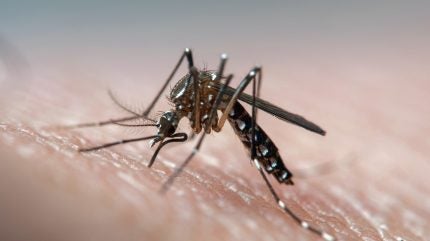
New data published by the UK Health Security Agency (UKHSA) has found that travel-related chikungunya cases are up 170%, as one of the country’s two approved vaccines remains controversial due to safety concerns.
Reported infections from the tropical virus have risen from 27 this time in 2024 to 73 in 2025, primarily stemming from travel to the Indian Ocean region – with the agency’s report specifically naming India, Mauritius and Sri Lanka.

Discover B2B Marketing That Performs
Combine business intelligence and editorial excellence to reach engaged professionals across 36 leading media platforms.
This follows a stream of outbreaks across the globe, with the European Centre for Disease Prevention and Control (ECDC) estimating that there have been 240,000 chikungunya cases worldwide between January and July 2025.
The mosquito-borne disease, spread by Aedes aegypti and Aedes albopictus, is associated with a sudden-onset fever and persistent joint pain that can last between one week and years after infection.
Though rarely fatal, there have been several outbreaks of the virus in the Americas, as well as South and East Asia, with infections primarily being problematic for individuals with pre-existing comorbidities or those who are immunocompromised.
The disease has also been shown to have a significant impact on neonatal health, raising the risk of death in infants born to mothers infected with the virus by 50%, says a report from Pharmaceutical Technology‘s parent company GlobalData.

US Tariffs are shifting - will you react or anticipate?
Don’t let policy changes catch you off guard. Stay proactive with real-time data and expert analysis.
By GlobalDataThere are two vaccines currently approved by the UK’s Medicines and Healthcare products Regulatory Agency (MHRA) to protect against infection by chikungunya: Bavarian Nordics’ Vimkunya and Valneva’s Ixchiq. These are available to purchase through private travel clinics, which are not part of the national immunisation schedule.
However, Ixchiq’s future has been hanging in the balance following its UK approval in February 2025. This is due to two deaths in the French territory of La Reunion linked to a mass vaccination programme involving Ixchiq, which was initiated after a significant chikungunya outbreak in March.
This has caused the UK’s Joint Committee on Vaccination and Immunisation (JCVI) to recommend the restriction of Ixchiq’s usage in elderly patients due to safety concerns. In the wake of this, the MHRA suspended the vaccine’s use in individuals aged 65 years and over, pending further review.
An investigation by US regulators, however, deemed the La Reunion deaths unlinked – resulting in the US pause being revoked. Despite this, the US Food and Drug Administration (FDA) has tightened restrictions around its use, advising that only individuals at high risk of contracting the disease receive Ixchiq.
This differs from the previous allocation, which recommended the vaccine’s use for those at intermediate risk.
A total of 17 adverse events (AEs) in patients over 62 years have been linked to the jab.
Despite the controversy faced by Ixchiq, analysts at GlobalData have predicted that the drug will generate higher sales than Vimkunya. By 2031, it is forecasted to bring in $237m compared with Bavarian Nordics’ vaccine, which is estimated to make $170m for the company.
This trend could be due to Ixchiq’s first-in-disease status, as the vaccine was given FDA clearance in November 2023.


